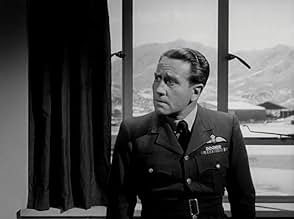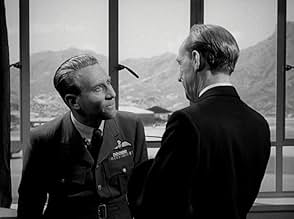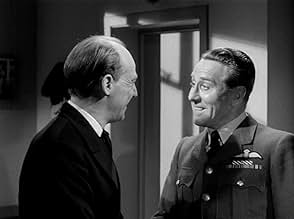NOTE IMDb
7,0/10
1,7 k
MA NOTE
Ajouter une intrigue dans votre langueOn a routine flight from Hong Kong to Japan, a British military transport aircraft's fate may or may not depend on a prophetic nightmare.On a routine flight from Hong Kong to Japan, a British military transport aircraft's fate may or may not depend on a prophetic nightmare.On a routine flight from Hong Kong to Japan, a British military transport aircraft's fate may or may not depend on a prophetic nightmare.
- Réalisation
- Scénario
- Casting principal
- Nomination aux 4 BAFTA Awards
- 4 nominations au total
Avis à la une
The seediness of the post-war colonial Far East and that rather morbid fascination with death and fate that pervades the consciousness of people who have been through a world-shattering conflict flavours this film. A great script (by RC Sherriff of 'Journeys End' fame) and a great cast - headed by that master of actorly understatement, Micheal Redgrave - slowly build the story, bit by bit. The exotic setting, where strange things could happen. The drab ordinariness of military outposts - which hightens the surreality of the events. A sense of a military and aristocratic world giving way with poor grace to the brash 'modern' future - epitomised by the crass Brummagem scrap dealer (accompanied by his effete elderly public-school personal assistant). The sense of dread is created by the pure spoken word and performance - of a good tale well-told. MR James in the age of Dakotas.
This is a film which will stay with you for a long time. Its title sets the tone for what follows : a flight which, as it continues, looks more and more to be one that will end in disaster and thus, apparently, mean that a man's dream regarding it will come frighteningly true. The increasing sense of foreboding is alleviated at one time or another by a development that appears to be at odds with the dream, that is, until something else transpires which then sees the exact circumstances of the dream restored. It is a film which, not unnaturally, gives rise to tension-laden conversations about whether there is such a thing as fate, but that is not the main impact of this film, which is that one's attention is riveted from the opening scene to the final shocking end.
until
until
A 1950's movie from the British studios. The basis of the plot is relatively simple, however, the outcome is never really obvious. It may not keep you on the edge of your seat biting your nails but it does keep you guessing till the end. A few lines at the very end by two of the lesser characters adds a finish not really seen till the advent of the "Twighlight Zone" TV series. Shakespeare used the use of dreams in many of his plays. This created his characters thoughts and actions. It seems that this method is used in this film for the same reason and pushes the movie along. The movie has a classic British cast such as Michael Redgrave and Denholm Elliott. Whilst the other actors names might not be easily recalled. They are readily identifiable and seen in numerous British movies of the 1940's and 50's. There is a small amount comic relief in the movie through the minor characters of two British soldiers. Australian viewers may even find hard to recognize one of them as being the local classic actor Bill Kerr. It is an old fashioned movie worthy of a watch.
I saw this movie in 1955, when I was 35 and not so long after my time in the Air Force in WWII, so the RAF flight in the Dakota (same as our USAF C47 and the civilian DC3) resonated for me. But it was really the extraordinary level of suspense that made it so memorable. It starts with a dream of a Dakota lost in a storm and crashing onto a rocky beach. Crucial is the exact number on board. As the real trip progresses in stages, passengers get on and off. Just as it seems the fatal number has been circumvented, something happens to re-institute it. The way this was done was so believable and artfully handled. I particularly remember an episode with someone pointing out that telling the pilot the dream is not such a good idea; after all, he needs his skills to fly the plane safely, and if he takes the dream seriously and it makes him nervous...I have used this idea the rest of my life when directing hundreds of people. It touches on a profound bit of philosophy: when is deception justified? A great movie: if you get the chance, don't miss it.
On display is one of the greatest scenarios ever presented in film - a flight over the Orient of which an anonymous British officer has had a dream premonition of disaster. What is so great about this idea and how it was executed here is that the dream itself is simply a catalyst for a psychological probing of the behavior of the passengers once they learn one-by-one about the particulars of the dream and how these particulars are playing out in their real flight. The theme then becomes the old-as-Shakespeare literary idea of fate vs. free will, but the strength of the filmmakers is that it is never resolved conclusively in the end. Even when the characters do hint at not letting a particular passenger on board the plane because this passenger has been prophesized to be an integral part of the disaster, they take no serious action to remove him, instinctively realizing that even that may not give them greater control over the situation.
The contrast of a modern technological artifice such as an aircraft with an archaic-style premonition is so brilliant because it portrays the ultimate paradox of human technological evolution: the farther human beings advance in their technological feats of control, paradoxically, the greater their lives are placed in the hands of the gods (fate) with all the many ways in which that technology can go tragically awry. For a simple idea, the filmmakers were obviously thinking, and they have added multiple layers to the story. "Night My Number Came Up" is a film I hope to see many times to pick up some themes I missed the first time. Like paintings, writing, and other forms of art, I believe that it is this characteristic which distinguishes great art from all the rest.
The contrast of a modern technological artifice such as an aircraft with an archaic-style premonition is so brilliant because it portrays the ultimate paradox of human technological evolution: the farther human beings advance in their technological feats of control, paradoxically, the greater their lives are placed in the hands of the gods (fate) with all the many ways in which that technology can go tragically awry. For a simple idea, the filmmakers were obviously thinking, and they have added multiple layers to the story. "Night My Number Came Up" is a film I hope to see many times to pick up some themes I missed the first time. Like paintings, writing, and other forms of art, I believe that it is this characteristic which distinguishes great art from all the rest.
Le saviez-vous
- AnecdotesThe script is based on a personal account by Sir Victor Goddard.
- GaffesClearly, different cockpits were used in different shots. The altimeter keeps switching back and forth between two quite different designs and layouts.
- Citations
Mary Campbell: Anyone with sense has doubts.
- Crédits fousOpening credits, prior to film title: There were 8 passengers 5 crew
Meilleurs choix
Connectez-vous pour évaluer et suivre la liste de favoris afin de recevoir des recommandations personnalisées
- How long is The Night My Number Came Up?Alimenté par Alexa
Détails
- Date de sortie
- Pays d’origine
- Langue
- Aussi connu sous le nom de
- The Night My Number Came Up
- Lieux de tournage
- Ealing Studios, Ealing, Londres, Angleterre, Royaume-Uni(studio: made at)
- Sociétés de production
- Voir plus de crédits d'entreprise sur IMDbPro
- Durée
- 1h 34min(94 min)
- Couleur
- Rapport de forme
- 1.33 : 1
- 1.85 : 1(originally intended theatrical ratio)
Contribuer à cette page
Suggérer une modification ou ajouter du contenu manquant


























